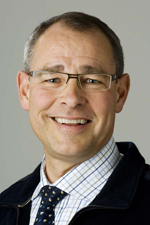Interview with professor Hans Erik Bøtker: COST-networks move your research field
Professor Hans Erik Bøtker and three of his international colleagues wanted a stronger European network within their field of research - Cardiology. Therefore, they applied for a COST network, and today they have a network in which 20 countries are represented. He sees the COST network as an excellent funding possibility for researchers, and he believes that they have managed to organise an excellent network with lots of potential.

However, it did required a lot of time and two proposals before they managed to receive funding. After their first proposal they received useful feedback which they were able to take advantage of when writing their second proposal. Four of the researchers took the lead on the second proposal, and the other partners provided input. It took them approximately four months to complete the proposal. The effort was well spent, as they received 79,000 euro toward establishing the network.
The COST grant has resulted in a strong network representing 36 people and 20 countries. "We have formed an executive board that has identified topics for four working groups, each with its own manager'," explains Hans Erik Bøtker:
• One group has been assigned to finding new research areas.
• One group will be dealing with combination therapy
• One group will look at external factors that might affect our interventions e.g. diabetes
• And one group is actually a consortium collaborating across all participants. Their job is to make experimental and clinical trials complement each other.
The executive board and each working group hold two meetings a year. In addition to those meetings, we have Skype meetings and email correspondence.
The network paves the way for large proposal
Obviously, Hans Erik Bøtker hopes that the network in itself will have valuable academic outcomes, one of which could be the development of new approaches and new methods, e.g. bio-informatics.' We need to develop new ideas, and we have a strategy for new approaches to treatment of cardiological diseases. Consequently, this network is of decisive importance, as we will only be able to move the field forward if we work together. Each of us is very good in our separate field, and by pooling our knowledge and our competences, we become strong. The network also improves the possibility of applying for other grants, and we will spare no effort to prepare proposals. We are hopeful and optimistic'," says the professor.
Good advice
Hans Erik Bøtker has some useful hints for anyone wanting to apply for funding for a COST network. "Make sure that you are doing it together with someone you trust and someone with whom you are already collaborating. And you need professional help with the budget and with the wording of the proposal. You will save time, if you receive input from people who know how to do it. They look at a proposal from another point of view. They can tell whether it makes sense in a wider context. So use the Research Support Office (link) when writing proposals'," he says.
About COST
COST (European Co-operation in the field of Scientific and Technical Research) aims to support ground-breaking scientific work that can lead to new concepts and new products.
Thus, COST, contributes to strengthening European research and innovation capacity. Among other things, COST actions are meant to prepare the network partners for participation in Horizon 2020 research projects.
Who can apply?
Researchers affiliated with Danish research institutions and Danish businesses. Researchers from at least five COST/associated countries must be represented in the network. Since 2014, COST has focused sharply on the participation of businesses and on collaboration with researchers from the EU13 - the so-called 'Inclusiveness Target Countries’.
What costs are eligible?
COST supports the setting up of and participation in research networks. The networks are called 'actions'. COST does not support research activities as such, but supports cooperation on research and the building of networks.
COST covers costs for:
• The establishment of research centres
• Research stays of up to three months
• Training
• Conferences, seminars and workshops
• Use of research infrastructures
• Travel and accommodation expenses of researchers attending COST actions meetings.
Read more here.